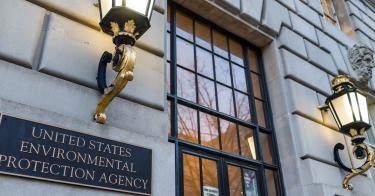“Pay no attention to that man behind that curtain!” The Wizard of Oz had a good reason for trying to distract Dorothy when his true identity was revealed in the 1939 classic film. The last thing he wanted was for her to figure how things really operated.
Oz isn’t the only place where people are ignorant of who operates quietly in the shadows. The federal government is rife with people who do their jobs away from the spotlight, wielding a measure of influence that can even outweigh that of their bosses.
Take the Environmental Protection Agency (EPA). You may be aware that its current administrator is a man appointed by President Trump — Scott Pruitt. But there’s a good chance you’ve never heard of Francesca Grifo, the agency’s “scientific integrity official.”
And frankly, that’s fine by Ms. Grifo. The less you know about her and many other unelected bureaucrats, the easier their jobs are. Especially because Ms. Grifo’s current job appears to be trying to subvert Mr. Pruitt’s.
Ms. Grifo was hired in 2013. Her position as scientific integrity official grew out of President Obama’s stated goal to “restore science to its rightful place,” as he put it in his 2009 Inaugural address.
Like so many other titles and goals, it all sounds pretty harmless. But as Wall Street Journal columnist Kimberly Strassel recently pointed out, a political motive was at work. This was, she writes, Mr. Obama’s “way of warning Republicans that there’d be no more debate on climate change or other liberal environmental priorities.”
Ms. Grifo came to the agency from the far-left Union of Concerned Scientists, so you can imagine why she was selected. You can also imagine what her job boils down to now that Donald Trump is president: thwarting his agenda as much as possible.
Toward that end is a meeting she’ll be hosting soon with numerous groups to discuss ways to pursue “scientific integrity.” The initial guest list read like a who’s who of the liberal environmental movement: Earthjustice, Public Citizen, the Environmental Defense Fund, the Natural Resources Defense Council, the Center for Progressive Reform, Public Employees for Environmental Responsibility, and yes, the Union of Concerned Scientists.
“This is a government employee using taxpayer funds to gather political activists on government grounds to plot — let’s not kid ourselves — ways to sabotage the Trump administration,” Ms. Strassel writes. (Since then, some conservative groups have been invited as well, but it took Ms. Strassel’s column to do it.)
It isn’t just disagreements over policy that fuels the behind-the-scenes activities of bureaucrats such as Francesca Grifo. They surely have their eyes on the budget cuts that the president has proposed to climate programs.
Climate Wire called his budget “a slap in the face.” To Scientific American, it’s a “slaughter.” Think Progress deems it “a punitive assault on science, the environment, and indeed the planet.”
But as environmental experts Katie Tubb and Nicolas Loris point out in a piece for the Daily Signal, all this hyperventilating lacks context.
For one thing, some cuts to the federal government’s sizable climate budget are clearly in order: At least 18 agencies administer climate-change activities, to the tune of $77 billion between fiscal years 2008 and 2013.
There’s a lot of wasteful spending in there, such as $700,000 to a global-warming musical, and an EPA grant for “green” nail salon concepts in California. Moreover, Ms. Tubb and Mr. Loris note, most of the money goes to “green” tech rather than to science, wildlife or international aid. “Even after the president’s proposed cuts,” they write, “there is plenty of money left in the federal budget to study and model the climate.”
If President Trump wants to make any headway at the EPA and other federal agencies, he needs to do more than appoint good people to run them. He needs to make sure that the people behind the curtain aren’t working to undermine him.
This piece originally appeared in The Washington Times




